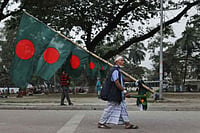A cheetah that had strayed out of the Kuno National Park recently continued to move about close to a village in the vicinity on Monday and was seen drinking water from the Kwari river, a forest department official said.
Oban, one of the eight cheetahs brought from Namibia in September last year, had on Sunday strayed into a field near Baroda village, some 15-20 kilometres from KNP, from the free range area of the park into which it was released last month, the official said.
It has been spotted close to an adjoining village and was moving in a one-kilometre area adjacent to KNP, Sheopur divisional forest officer PK Verma said. "This is a normal process for the animal. The cheetah is staying away from the village and has reached there as the spot is adjoining the KNP. Its movement is being monitored through its collared device," he said.
So far, four out of eight cheetahs brought from Namibia to KNP in September, 2022, have been released in the wild (free range area) from hunting enclosures. Oban and Asha were released into the wild on March 11, while Elton and Freddie, also known as "rockstars" due to their names, were allowed to move into the free-range area on March 22.
Eight Namibian cheetahs, comprising five females and three males, were brought to KNP as part of an ambitious reintroduction programme of the species and were released into special enclosures on September 17 by Prime Minister Narendra Modi.
One of them, Sasha, died of a kidney ailment on March 27, while another, Siyaya, gave birth to four cubs, which were first spotted on March 29. A set of 12 cheetahs, comprising seven males and five females, were brought in from South Africa on February 18 this year.


























